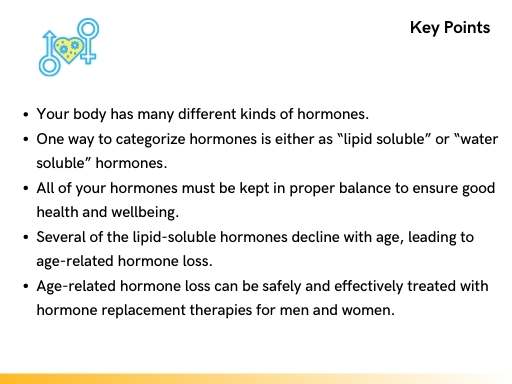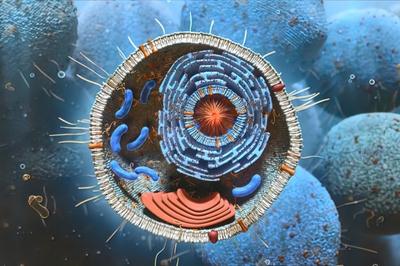 Lipid-soluble hormones such as testosterone, estrogen, progesterone, cortisol, and aldosterone are some of your body’s most important hormones.
Lipid-soluble hormones such as testosterone, estrogen, progesterone, cortisol, and aldosterone are some of your body’s most important hormones.
Hormones are your body’s chemical messengers. They control or stimulate just about every critical biological process, from digestion to reproduction. Medical science has identified more than 50 different individual hormones produced and secreted by the glands and organs of your body. These are all divided into various categories and sub-categories.
Two broad categories or types of hormones are based on their mechanisms of action and how they interact with their target cells – Lipid or “fat-soluble” hormones and “water-soluble” hormones.
Lipid-soluble hormones are those that can penetrate or cross over the cell membranes to interact with receptor sites within the cell. Water-soluble hormones cannot cross through the cell membrane and must interact with hormone receptors on the outer wall of the target cell.
What Are Lipid Soluble Hormones
 Hormones are often defined as “steroid” or “non-steroid hormones.” Another way hormones are defined or categorized is as being water soluble or fat soluble. Fat-soluble or lipid-soluble hormones, by definition, “dissolve in fat.” Biologically that means they can permeate or “dissolve” through the walls of the cell membrane and interact with hormone-specific receptor sites within the cell. Hormones such as estrogen, testosterone, progesterone, cortisol, some adrenal hormones, and thyroid hormones are lipid soluble and repel water.
Hormones are often defined as “steroid” or “non-steroid hormones.” Another way hormones are defined or categorized is as being water soluble or fat soluble. Fat-soluble or lipid-soluble hormones, by definition, “dissolve in fat.” Biologically that means they can permeate or “dissolve” through the walls of the cell membrane and interact with hormone-specific receptor sites within the cell. Hormones such as estrogen, testosterone, progesterone, cortisol, some adrenal hormones, and thyroid hormones are lipid soluble and repel water.
Water-soluble hormones VS Lipid-soluble hormones
Since water-soluble hormones dissolve in water, they travel freely suspended in the bloodstream but “bounce off” the fat layers of cell membranes and, therefore, must interact with hormone receptors external to target cells. Fat or lipid-soluble hormones, on the other hand, can move across the cell membrane. However, since they cannot dissolve in water and travel freely through the blood as water-soluble hormones do, lipid-soluble hormones need to bind to specific proteins – albumin, for example – to travel through the blood and interact with their targets.
Types of Lipid-Soluble Hormones
Some of your body’s most essential hormones fall into to “lipid soluble” category – including the “sex hormones” progesterone, estrogen, and testosterone – and other important hormones such as cortisol and aldosterone.
Progesterone
Progesterone is the lipid hormone that is most related to pregnancy. Progesterone prepares the endometrium – the lining of the uterus for pregnancy after ovulation. It triggers the lining to thicken to accommodate a fertilized egg. It also prohibits the muscle contractions in the uterus that would cause the body to reject an egg. Progesterone continues to play a significant role throughout pregnancy, helping to support fetal development and the production of breast milk.
Estrogen
Contrary to what you might think, “estrogen” is not one particular hormone but refers to a group of female hormones that play a very important role in female sexual maturity and female reproduction. The ovaries are the primary source of estrogen. Age-related estrogen loss in women is the main cause of the well-known debilitating symptoms of menopause, such as night sweats, hot flashes, and mood swings – which all occur due to the dramatic drop of estrogen after a woman stops her last menstrual period.
Cortisol
Cortisol is the so-called “stress hormone.” It is the fat-soluble hormone most related to your body’s “fight or flight” response. It is made and released by the adrenal glands. It is the release of cortisol when you are in a fearful or dangerous situation that prepares your body to run or literally fight for your life. From an evolutionary standpoint, cortisol plays an important role in surviving dangerous situations. However, the problem with cortisol is that the everyday “stress” of modern life, can lead to elevated cortisol levels – and unlike a sudden attack in the jungle by a beast – that “everyday danger” does not pass – leading to chronic stress. Chronic stress can cause higher than needed levels of cortisol in the blood which can have many unhealthy impacts for men, not the least of which is a reduction of testosterone level.
Testosterone
Most likely, you know that testosterone is the main “androgen” or male hormone. Testosterone is a “sex hormone,” which means its primary role is the development of all of the traits we traditionally prescribe to “maleness,” such as larger muscles, more facial and body hair, deeper voices, etc. As such, testosterone levels sharply increase at puberty, leading to the maturation of the sex organs and the development of those previously described “male” secondary sexual characteristics. Even after a boy has reached sexual maturity, testosterone continues to play a critical role in strength and vitality. However, like the female sex hormones – progesterone and estrogen – testosterone in males declines with age. Age-related testosterone loss, also known as “low testosterone” or “andropause,” can lead to a number of health issues, including but not limited to sexual health issues, lack of strength and energy, and cognitive difficulties.
Aldosterone
Aldosterone, also known as ALD, is one of the hormones produced and released by the adrenal glands. ALD’s primary role is the regulation of the level of salt and potassium in your blood, and therefore it plays a crucial role in helping to maintain healthy blood pressure. Having too much or too little aldosterone in your body can cause health issues. Aldosterone, since it deals with the regulation of electrolytes in the blood, also plays a role in kidney function and in maintaining proper blood volume and the pH level of the blood.
What If You Are Lacking Lipid Soluble Hormones?
 Good health depends on all of your hormones – including the lipid-soluble hormones – to be at their right levels and in proper balance. Your hormones all work together in a kind of complex dance. If any one of them is “out of step,” the whole dance is off.
Good health depends on all of your hormones – including the lipid-soluble hormones – to be at their right levels and in proper balance. Your hormones all work together in a kind of complex dance. If any one of them is “out of step,” the whole dance is off.
There can be any number of reasons for a hormone imbalance. Hormone imbalances occur when you have too much or too little of a given hormone – however, too little hormone is the more common problem. This is particularly true of the lipid-soluble sex hormones – testosterone, progesterone, and estrogen – all of which decline as men and women age.
However, the good news is that hormone replacement therapies can be used to give you back what time and mother nature take away! Hormone replacement therapy – particularly testosterone replacement for men and estrogen replacement for women – can provide the following benefits:
- Improved libido and sexual function.
- Weight loss.
- Improved ability to build lean muscle.
- Improved heart health, lowered risk of cardiovascular disease and other metabolic conditions such as high blood pressure and diabetes.
- Improved moods.
- Reduction of menopausal symptoms (women)
- Reduction of issues with erectile dysfunction (men)
- Improved memory and cognition.
- Better sleep.
- Lower risk of osteoporosis and osteoporosis-related fractures.
- Improved hair, skin, and nails.
- An overall improved outlook on life and sense of wellbeing.
Conclusion
Lipid-soluble hormones, like all of your hormones, play a vital role in your health and overall wellbeing. Unfortunately, some of your most important fat-soluble hormones, such as testosterone, decline as you age. Hormone replacement therapy is a safe and effective way to bring all of your hormones back into balance for optimum health and longevity.

